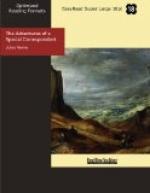I was about to cross the countries which were formerly ravaged by Tamerlane and Genghis Khan, those fabulous countries of which the Russians in 1886 possessed six hundred and fifteen thousand square kilometres, with thirteen hundred thousand inhabitants. The southern part of this region now forms the Transcaspian province, divided into six districts, Fort Alexandrovski, Krasnovodsk, Askhabad, Karibent, Merv, Pendjeh, governed by Muscovite colonels or lieutenant-colonels.
As may be imagined, it hardly takes an hour to see Uzun Ada, the name of which means Long Island. It is almost a town, but a modern town, traced with a square, drawn with a line or a large carpet of yellow sand. No monuments, no memories, bridges of planks, houses of wood, to which comfort is beginning to add a few mansions in stone. One can see what this, first station of the Transcaspian will be like in fifty years; a great city after having been a great railway station.
Do not think that there are no hotels. Among others there is the Hotel du Czar, which has a good table, good rooms and good beds. But the question of beds has no interest for me. As the train starts at four o’clock this afternoon, to begin with, I must telegraph to the Twentieth Century, by the Caspian cable, that I am at my post at the Uzun Ada station. That done, I can see if I can pick up anything worth reporting.
Nothing is more simple. It consists in opening an account with those of my companions with whom I may have to do during the journey. That is my custom, I always find it answers, and while waiting for the unknown, I write down the known in my pocketbook, with a number to distinguish each:
1. Fulk Ephrinell, American. 2. Miss Horatia Bluett, English. 3. Major Noltitz, Russian. 4. Monsieur Caterna, French. 5. Madame Caterna, French. 6. Baron Weissschnitzerdoerfer, German.
As to the Chinese, they will have a number later on, when I have made up my mind about them. As to the individual in the box, I intend to enter into communication with him, or her, and to be of assistance in that quarter if I can do so without betraying the secret.
The train is already marshaled in the station. It is composed of first and second-class cars, a restaurant car and two baggage vans. These cars are painted of a light color, an excellent precaution against the heat and against the cold. For in the Central Asian provinces the temperature ranges between fifty degrees centigrade above zero and twenty below, and in a range of seventy degrees it is only prudent to minimize the effects.
These cars are in a convenient manner joined together by gangways, on the American plan. Instead of being shut up in a compartment, the traveler strolls about along the whole length of the train. There is room to pass between the stuffed seats, and in the front and rear of each car are the platforms united by the gangways. This facility of communication assures the security of the train.




